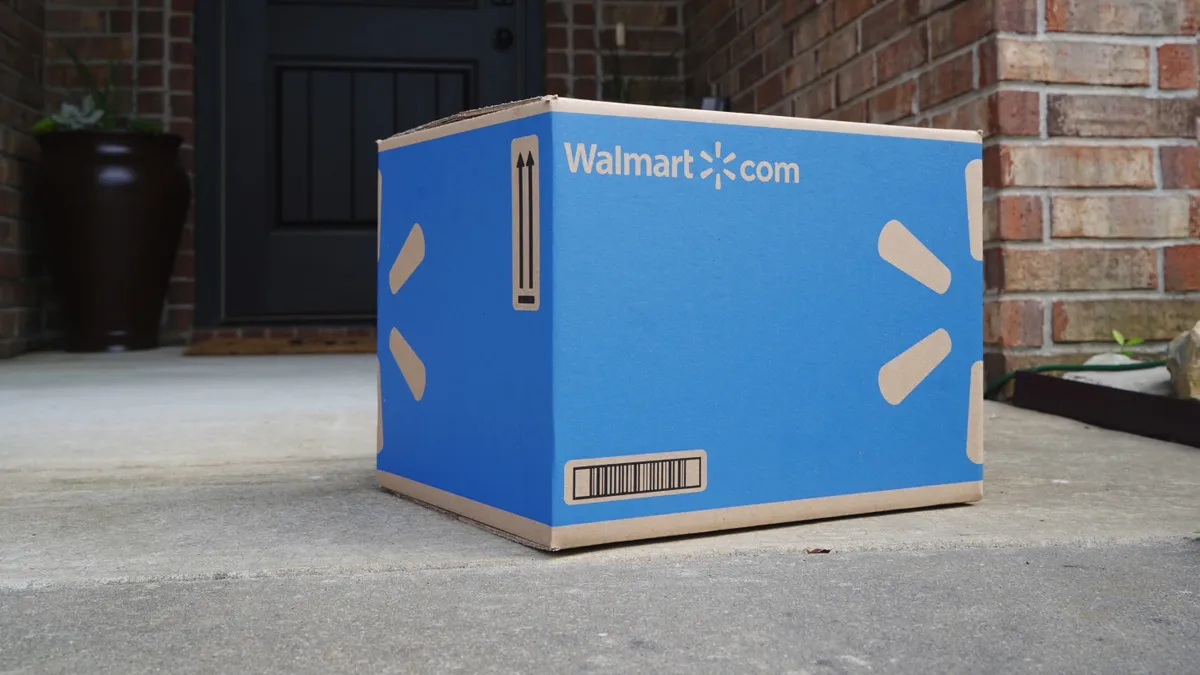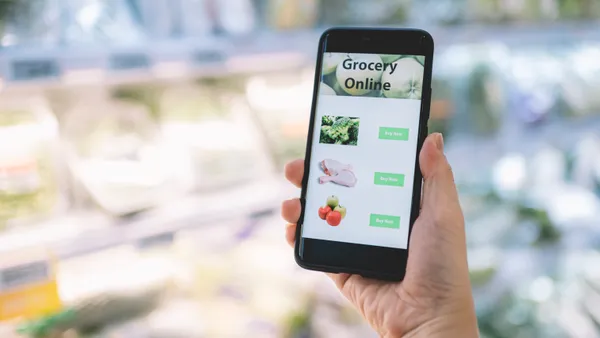UPDATE: Aug. 21, 2020: Amazon reached out after this story was published to dispute the conclusion by TABS Analytics that Walmart had overtaken it in the online grocery space. "The primary conclusion reached in this study is wrong. We’ve seen online grocery orders more than double in August year-over-year and online grocery sales triple year-over-year based on Q2 earnings results, and it continues to be one of the fastest growing businesses at Amazon," an Amazon spokesperson said in an email, without elaborating.
In response to Amazon's statement, Kurt Jetta, executive chairman and founder of TABS, said he stands by the survey’s findings. “I’m comfortable with the results. I’m comfortable with the conclusions,” Jetta said. “This study has been uncanny in its ability to be an early predictor of things we see in the market. Any way we sliced [the data], Walmart was higher.”
Dive Brief:
- Walmart has passed Amazon as the top online food retailer, according to a survey of 1,000 adults conducted this month by TABS Analytics, a company that studies the consumer products industry. Walmart accounts for about 30% of online grocery transactions, similar to its level last year, but Amazon’s share has fallen to about 27% from about 33% in 2019.
- Smaller online food retailers have grown their share of the grocery e-commerce market significantly faster than their bigger competitors, the study found. These companies recorded a 140% year-over-year increase in the number of transactions they saw.
- The proportion of adults who shop online for groceries regularly is lower in 2020 than it was last year, according to the research. Twenty-nine percent of shoppers indicated that they use e-commerce platforms to buy groceries at least six times a year, down from 35%.
Dive Insight:
As Walmart and Amazon continued their battle for supremacy in online grocery, other companies have muscled their way to a larger share of the category. Smaller firms like FreshDirect and NetGrocer now account for more than 16% of the grocery e-commerce market, more than double the portion they commanded just a year ago. On the other hand, these secondary players have relatively low levels of repeat customers, suggesting that they may not be able to sustain their momentum, according to TABS Analytics.
The study found that retailers are having a hard time convincing shoppers to increase their use of online platforms. Just 29% of shoppers said they make online grocery purchases regularly — which the study defined as at least six times per year — compared with 35% last year.
In-store purchases at traditional grocery stores continue to dominate people’s shopping habits, with 76% of the shoppers TABS surveyed indicating they visit these merchants on a regular basis, down from 80% in 2019. Value-focused retailers like Aldi raised their share from 23% to 30%.
The finding by TABS Analytics that fewer shoppers are using online grocery services regularly comes as big retailers continue to report e-commerce is powering their growth. Walmart reported Tuesday that it saw online sales in the second quarter nearly double year-over-year, and Target, which recently announced that it would expand grocery pickup services to most of its stores, said Wednesday morning that its curbside pickup business surged more than 700% during its latest quarter.
That growth is being driven by heavier shopping by existing purchasers, not by growth in the number of shoppers who are entering the grocery e-commerce arena, the TABS findings suggest. There was only a slight increase in grocery e-commerce sales from new shoppers this year even as online shopping continues to record growth, the research shows.
The inability of grocers to expand the e-commerce tent meaningfully indicates that they will need to need to make changes like raising prices to overcome the costs associated with running their online services, according to Kurt Jetta, executive chairman and founder of TABS.
"Since e-commerce grocery has not succeeded in expanding the pool of buyers at a time when demand is expected to be greatest, it has become even clearer that this channel will never have the scale necessary to be profitable with the current business model," Jetta said in a statement.













